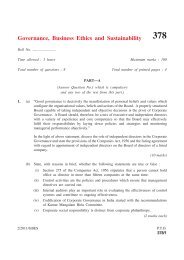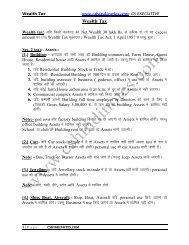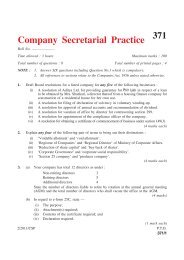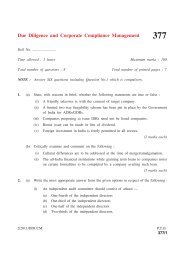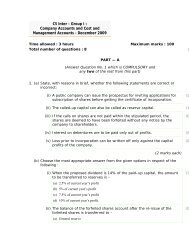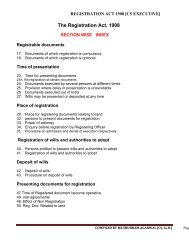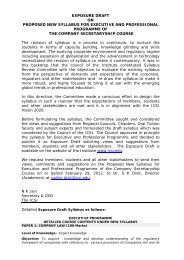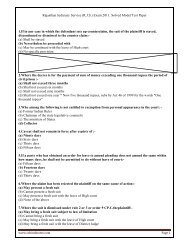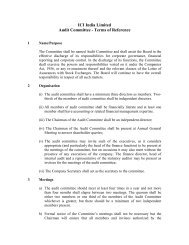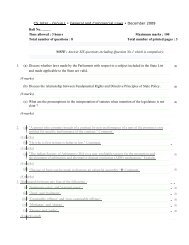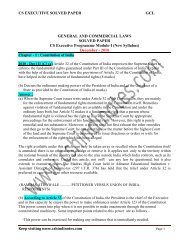SOLVED PAPER GCL JUNE 2011 - CS NOTES
SOLVED PAPER GCL JUNE 2011 - CS NOTES
SOLVED PAPER GCL JUNE 2011 - CS NOTES
Create successful ePaper yourself
Turn your PDF publications into a flip-book with our unique Google optimized e-Paper software.
cause being given gets justice. This writ orders the authority confining the person to give proper<br />
reasons for doing so. Articles 32 and 226 give the right to approach the Supreme Court and the High<br />
Courts for obtaining this writ. This writ is issued when a case outlining the need for such a writ is<br />
made. It ensures that no man is detained without the proper procedure being followed and without<br />
proper cause, and it keeps the authorities from arbitrary legal action. The person detained or his<br />
legal representative can move the court for this writ. This writ demands the restraining authority to<br />
present the detained person before the court with the proof that led to his arrest or detention. This<br />
allows the court to judge whether his detention was justified to begin with.<br />
<strong>2011</strong> ‐ June [2] Write notes on any four of the following :<br />
(i) Penalties which can be imposed on public information officer under section 20 of the Right to<br />
Information Act, 2005<br />
(ii) Temporary and perpetual injunction<br />
(iii) Malicious prosecution<br />
(iv) Res gestae<br />
(v) Primary and secondary evidence. (4 marks each)<br />
Ans. (i) Penalties which can be imposed on public information officer under section 20 of the Right to<br />
Information Act, 2005<br />
Section 20 (1) of the RTI Act states, “Where the Central Information Commission or the State<br />
Information Commission, as the case may be, at the time of deciding any complaint or appeal is of<br />
the opinion that the Central Public Information Officer or the State Public Information Officer, as the<br />
case may be, has, without any reasonable cause, refused to receive an application for information or<br />
has not furnished information within the time specified under sub‐section (1) of section 7 or<br />
malafidely denied the request for information or knowingly given incorrect, incomplete or<br />
misleading information or destroyed information which was the subject of the request or obstructed in<br />
any manner in furnishing the information, it shall impose a penalty of two hundred and fifty<br />
rupees each day till application is received or information is furnished, so however, the total amount<br />
of such penalty shall not exceed twenty five thousand rupees. However, the Central Public<br />
Information Officer or the State Public Information Officer, as the case may be, shall be given a<br />
reasonable opportunity of being heard before any penalty is imposed on him.<br />
Section 20 reveals that there are three circumstances where the Commission must<br />
impose penalty:<br />
1) Refusal to receive an application for information.<br />
2) Not furnishing information within the time specified under sub‐section (1) of section 7 – 30<br />
days.<br />
3) Malafidely denying the request for information or knowingly giving incorrect, incomplete or<br />
misleading information or destroying information which was the subject of the request<br />
4) Obstructing in any manner in furnishing the information.<br />
All the above are prefaced by the condition, ‘ without reasonable cause’<br />
(as per Decision No. CIC/SG/A/<strong>2011</strong>/000217/11995Penalty Appeal No. CIC/SG/A/<strong>2011</strong>/000217 of<br />
the CENTRAL INFORMATION COMMISSION)<br />
Ans. (ii) Temporary and perpetual<br />
I njunction<br />
‘Temporary injunctions’ or ‘interlocutory injunctions’, according to Order XXXIX of the Code of Civil<br />
Procedure, 1908, means an order passed by a court to restrain someone from doing something that<br />
would result in alienation of property, or its destruction, or when the plaintiff is in danger of being<br />
dispossessed altogether. The plaintiff needs to establish to the satisfaction of the court that the<br />
losses suffered by him would be irreversible, and of such a nature as cannot be compensated, if the<br />
injunction is not granted. Such an injunction is for a short duration of time, normally for the time<br />
taken by the court to reach a final decision. It is issued after the suit has been filed and when it<br />
remains pending. A prima facie case and balance of convenience in the plaintiff’s favor are essential<br />
to get a temporary injunction issued.


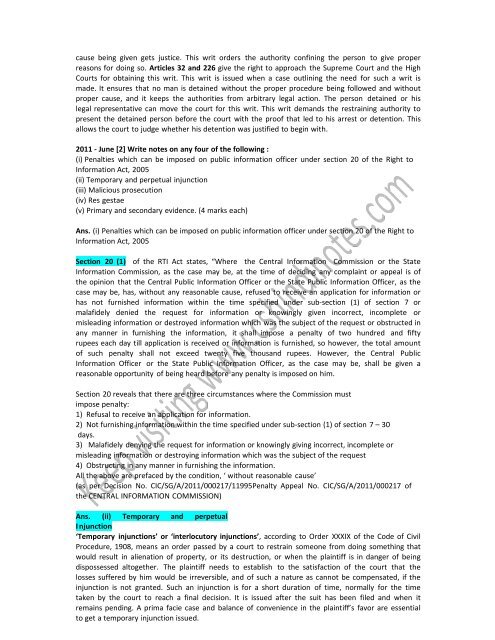
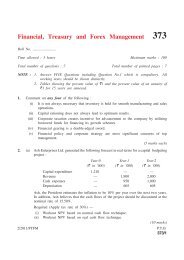

![vf/kfu;e dk vFkZ 'fu.kZ;' [ Interpretation of Statues ] Statue ... - cs notes](https://img.yumpu.com/38855798/1/190x245/vf-kfue-dk-vfkz-fukz-interpretation-of-statues-statue-cs-notes.jpg?quality=85)
